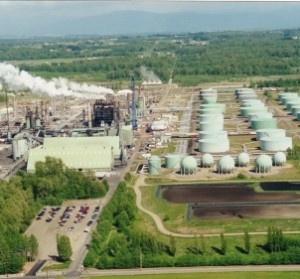17 May Seattle’s Slippery Slope on Arctic Oil
 Wonder what a mirror has to do with it? If so, join us for a spin through the Evergreen State and the Emerald City to learn about the benefits, challenges, and hallucinations induced by our collective consumption of Arctic Oil.
Wonder what a mirror has to do with it? If so, join us for a spin through the Evergreen State and the Emerald City to learn about the benefits, challenges, and hallucinations induced by our collective consumption of Arctic Oil.
City Councilmembers and the Mayor of Seattle say it is a moral imperative for Seattle Port Commissioners to NOT accept revenue from companies engaged in arctic oil exploration. In making this demand, they display moral rectitude seldom seen this side of the Pilgrims and the case is being pressed against the Port through a combination of political hardball, political theatrics, and an “Amen” chorus complete with some adherents waving polar bear hand puppets.
Yet, the city of Seattle, like the state and other local governments, collects millions of dollars in revenue from gas taxes and other resources drenched in – you guessed it — arctic oil.
Reasons for this contradictory state of affairs include our hybrid strain of climate change politics, our geology, our geography, our topography, our history and – more than anything – you.
It is highly probable that Seattle collectively consumes more arctic-sourced fuel than does any other city in the US. Goodness knows this is not because we want to. It is the outcome instead of our place in one of the nation’s most invisible networks for petroleum fuel production and distribution. And 35 years after “arctic drilling” was introduced both off-shore and on along Alaska’s North Slope, this system has been fueled by a tsunami of Arctic Oil.
Those giant tanks on Harbor Island in Elliot Bay?
They aren’t holding gold fish. They are part of the network that sustains our daily lives and enable us to drive to work, the park, the beach, the mountains and the local meeting of the Earth Justice League, and while some of us find this all morally repugnant, the fact most people don’t know about is one illustration of how well the system works.
Odds are you have heard or read none of this in the news coverage of the ongoing dialogue between our elected leaders from the city and the port. More uncovered news follows.

BP Refinery @ Cherry Point
Our Evergreen Oil “Bidness”
Washington is a major producer of gasoline, diesel oil and jet fuel. Almost nobody in the debate seems to know that.
According to federal, state and industry records, more than 600,000 barrels of petroleum products are turned out every day primarily by four oil refineries in the northwest part of state, including the BP Refinery at Cherry Point. A barrel equals 42 gallons. That translates into more than 25 million gallons daily, 365 days per year. Maybe that doesn’t sound like a lot to you, but it puts Washington near the top tier of petroleum-producing members of the entire United States.
According to the U.S. Energy Information Administration, (EIA), Washington’s output exceeds the petroleum capacity of Oregon, Idaho, Montana, Wyoming, Utah and Colorado combined (total: 480K barrels).
It even rivals or exceeds production capacity in a number of states closely identified with the energy industry. These include the birthplace of the US oil industry, Pennsylvania; Ohio (birthplace of Standard Oil; or even Oklahoma (! – birthplace of T. Boone Pickens).
EIA data shows only four states produce more fuel products than Washington. These include the behemoth producers, Texas, Louisiana and California (5-3 million barrels); and Illinois, with about 900K.
Because Washington produces so much more petroleum than we can consume the local supply goes out of state to supply most of Oregon and parts of northern California. It is also exported north into British Columbia. According to an industry survey in 2014, our fuel even pops up in Mexico, South America, Asia and Australia.
Public Benefits
According to an industry study published in 2014, the petroleum production and supply chain in Washington supports more than 25,000 jobs and almost $1.8 billion in personal income.
But, the general public also benefits because of all the property taxes, B&O taxes and other government fees paid for by the network, along with the retail goods and professional services purchased by employees or the companies which employ them.
To calculate state tax liabilities for businesses, the Washington State Department of Revenue legally requires every company to report its annual gross income for all of its activities conducted within the state.
In 2013, 41 companies that make petroleum products in Washington reported in-state sales of $30 billion. The 185 businesses engaged in wholesale-distribution reported sales of $7.7 billion. Retail outlets at 1,666 gas stations, convenience stories and supermarkets reported gasoline sales of $12 billion.
That adds up to nearly $50 billion in gross business revenue from the Washington state petroleum industry. That rivaled the dollar value of 2013 output by the Boeing Commercial Airplane Division where workers cranked out more than 630 jetliners, bringing in a gross of $52 billion.
Because of its value to the state economy, Boeing benefits from highly favorable tax policies. The petroleum sector? Not so much. More about that in a bit.

As our arctic sources are drawn down, what sources should take their place? The oil sands? The Bakken? More distant locations?
The Quirk
As our arctic sources are drawn down, what sources should take their place? The oil sands? The Bakken? More distant locations?
In spite of its surprising scale, the Washington petroleum industry comes with a major quirk. Our state produces no crude oil. As in, Zip. The only state mentioned in this article that also produces no crude is Oregon.
That means our petroleum supply is fueled entirely by oil that comes from outside the state. That brings us to our love-hate relationship with arctic-sourced crude.
A study published in 2013 by the Washington State Department of Commerce examined the sources of all oil refined in the state. The study showed 54% came from Alaska, 30% from Canada, 6% from Russia, 4% from Angola, and 6% from “other.”
Those shares changed slightly in a study published in 2014 by the Washington Research Council and the Western States Petroleum Association. It showed a rising mix of crude with about 46% from Alaska, with the Canadian conventional oil wells contributing 18%, the Canadian “oil sands” accounting for more than 8% and the Bakken oil from North Dakota and the upper Midwest accounting for 13%. “Other” stood at about 13%, meaning Angola, Russia and other exotic sources are still part of the mix.
All the Alaska oil comes to Washington via tanker. Tankers also haul much of the remainder, except for the oil delivered through a pipeline to Canada, and railroads that deliver the Bakken crude and much of the crude from the oil sands.
Because no pipeline crosses the Cascades, the vast majority of the petroleum products are shipped to retail suppliers through a pipeline network that stretches through western Washington. In-state fuel products are shipped to eastern Washington on barges that ply the Columbia River.
Seattle is a major crossroads for redistribution of in-state fuel, and because of our location, Seattleites are usually buying gasoline produced from Arctic Oil. As the previous data shows, it might also be possible to buy gasoline made from just about anywhere. But odds are it is rooted to the North Slope, and, at any given moment, some retailers aren’t selling fuel from anywhere else.
Taxes & the Conundrum
Even if you never buy any of this fuel as a consumer, you are benefiting from it via tax revenues and business fees that pay for public services.
The City of Seattle, the Seattle Public Schools, the Port of Seattle, the State of Washington and hundreds of other agencies across the state collect revenues from property taxes, B&O taxes and other fees from businesses in the petroleum network.
In addition, Seattle and other general purpose governments receive revenue allotments and grants from state and federal highway taxes charged to the wholesale purchase of every gallon of gasoline.
How much of the arctic-sourced fuel winds up in the coffers at Seattle City Hall? Nobody from the city appears to know.
A quick look at the Seattle city budget for 2015 shows the city receives nearly $13 million per year directly from the state gas tax. This year the city is also scheduled to receive about $38 million in federal and state grants for transportation purposes. Some or all of those grants could be based on fuel taxes.
So, how can city elected officials make a case that the Port must forgo arctic-related revenue while the city accepts tax revenue from the same arctic source?
And how far does the moral imperative extend? Should businesses in Seattle be prohibited from engaging in activities using arctic-sourced fuel? Should Seattle consumers be banned from buying it? The city banned plastic bags, made mostly from byproducts of natural gas. Why not gasoline?
If morality requires city leaders to pick fights with all the public agencies that receive revenues tainted by arctic oil, Seattle could wind up with a list of opponents longer than Manny Pacquiao.
Other Wrinkles
The argument against the Port leasing a public facility to companies engaged in arctic drilling is framed by some as a way to nip arctic drilling in the bud. In fact, arctic drilling, off-shore and on-shore, has been underway on the North Slope of Alaska for more than 35 years.
A case can be made that the environmental track record of our arctic-based petroleum industry is exemplary. That’s especially true if you compare it with oil extraction and distribution around the world. But, you can also argue it possesses a bad environmental record. Fair enough. The thing is, in Seattle, there’s no debate.
City leaders and environmental activists say the real issue is climate change.
But in the global scale of climate change, the arctic oil involved in the issue at the Port of Seattle – or Alaska, or the US share of the arctic – is a drop in the bucket. And, in many ways, for people in Seattle, it’s “our bucket.” For some, that’s because their livelihoods are related to it (and that includes many, many, many of us).
For just about everyone, its because we use arctic-based fuel and benefit from public services paid for by arctic-sourced oil.
Collaboration will be the key to figuring this all out.
Moral rectitude seems like a poor strategy to start the conversation.
